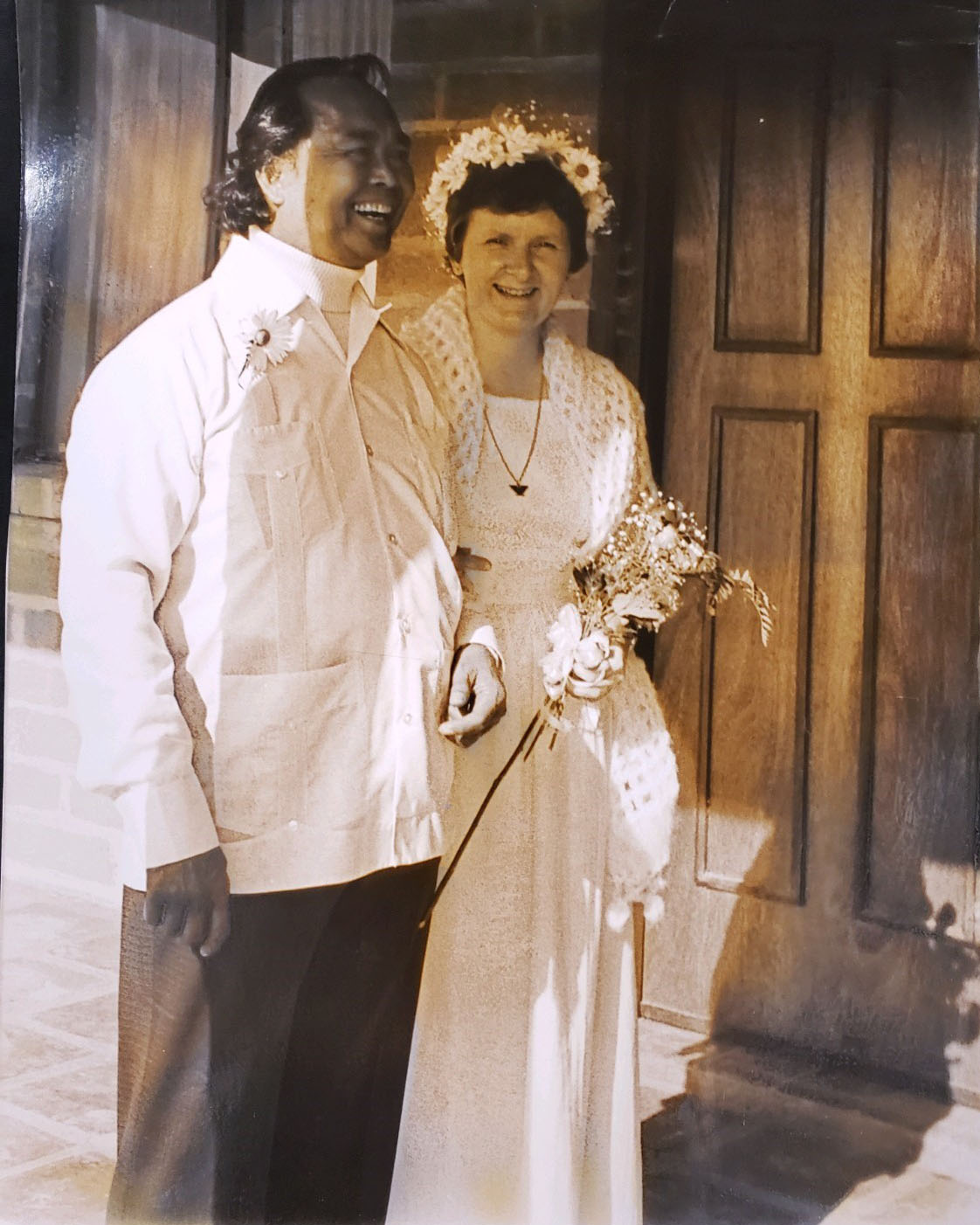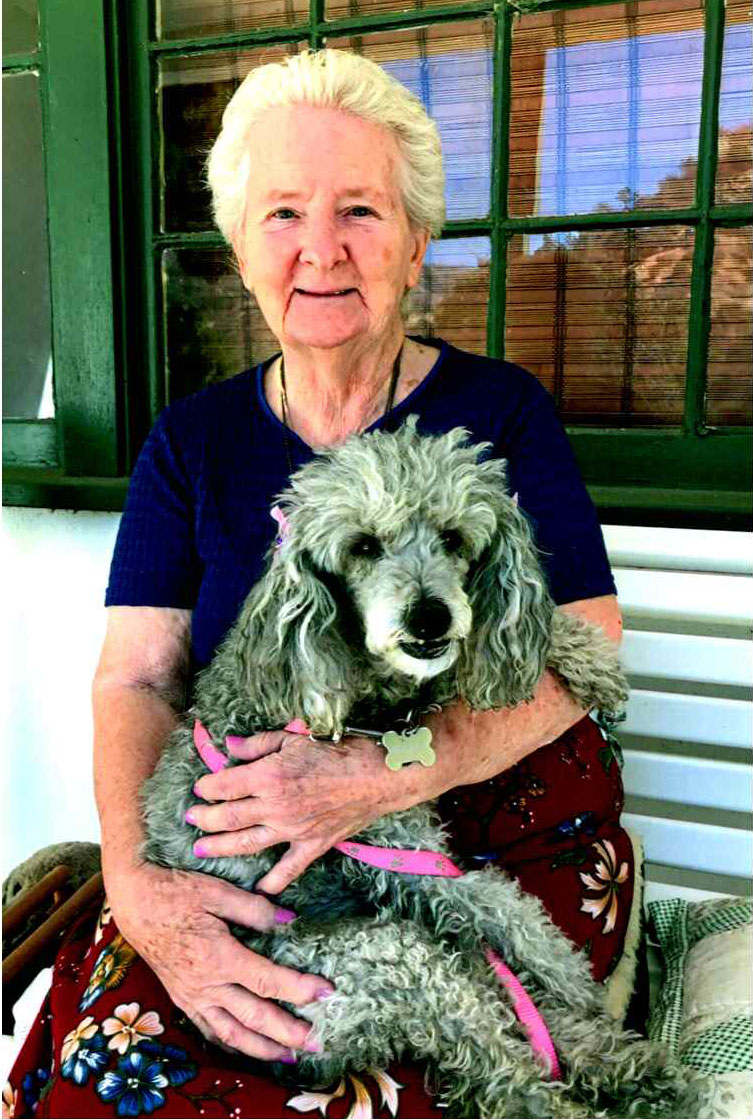Everyone with the United Farm Workers was deeply saddened at the passing on Wednesday, August 5 of Dolores Velasco, 85, who committed herself totally to the farm worker movement and for decades preserved the memories of her beloved husband, Filipino UFW leader Pete Velasco, and the heroic Filipino grape strikers who helped forge the first enduring farm workers’ union in U.S. history.
Dolores Ann Neubauer was born in Baltimore, Maryland in 1934, and raised in a devoutly Catholic family. “Dolly,” her nickname, always wanted to enter the convent, which she did in 1954 after graduating from the Seton High, an all-girls Catholic school.
She was teaching first grade at Notre Dame of Maryland School in Baltimore when Dolores met Peter Velasco who with Larry Itliong helped begin the 1965 Delano grape strike. Pete was assigned in 1973 as director of the union’s Baltimore boycott office. Dolores became an active supporter, bringing food, money and clothing to the boycotters weekly.

“Working with Peter and for what he was doing for poor people was very good for me,” Dolores explained. After a year, “I felt I needed to leave the convent and marry Peter Velasco.” They were wed in 1975 at the Paulo Agbayani Retirement Village for elderly Filipino farm workers on the movement’s Forty Acres property near Delano.
“She was the happiest I had ever seen her,” said Dolores’ sister, Frances Benninger. “She adored Pete and Pete adored her. It was a love match.”
“Pete’s marriage to Dolores was one of the most joyous moments of his life,” then-UFW President Arturo S. Rodriguez said in his eulogy for Pete after he passed away in 1995. “He told all of us how happy she made him.” Cesar Chavez’s brother Richard Chavez joked that “Pete Velasco was a great organizer because he organized a nun to be his wife.”
Dolores’ mission for the rest of her life was telling the story of Pete and other Manongs or respected Filipino elders. She always wore a large button with a photo of Pete. She kept documents and memorabilia chronicling the Manongs’ contributions, stayed in touch with Filipino activists and regularly shared during tours of the Agbayani Village and with visiting students, researchers and filmmakers at the National Chavez Center at La Paz in Keene, Calif. where she lived in a modest home next to Cesar and Helen Chavez’s house.
Dolores “really believed in Cesar’s vision of building a community at La Paz where we could live out our faith,” Arturo Rodriguez recalled. “In her humble and modest ways she helped make it happen.”
“Creating a sense of community is central in religious orders so Dolores approached building community at La Paz from the religious point of view,” observed Paul F. Chavez, Cesar’s son and president of the Cesar Chavez Foundation.
Dolores schooled generations of children at La Paz through the Catholic catechism, preparing them for First Communions and confirmations. Even children from outside La Paz received religious education from Dolores. One couple working on a local Tehachapi Mountains ranch sent their children to her.
Christmas season saw Dolores making sure a Nativity scene was set up under a large oak tree at La Paz. At Easter she organized people to do the Stations of the Cross that she set up outdoors.
Dolores helped arrange Sunday and special masses at La Paz. Many a couple getting married there received help with their ceremonies from Dolores.
“She did all this work but you never saw her,” Arturo noted. “Always in the background, she never wanted recognition.”
Dolores was also “funny, sharing corny jokes,” her sister Frances related. “She was a very caring, thoughtful person who remembered everyone’s birthdays with cards.” Countless people, including current and former movement staff, received personal cards from her every birthday and holiday season. She never missed a chance to express love or kindness.

As she declined in her final years, people from the La Paz community pitched in to reciprocate the affection Dolores gave them. Her clothes were picked up each week, washed and folded. They drove her to church every Sunday and for shopping, took her out to lunch or on walks with her cherished dog, Precious, and checked on her daily. Later, they took over her finances, paid her bills and protected her from scam artists. They did all the paperwork to get her approved for Veterans Administration benefits as Pete was an Army veteran.
For more than two years Dolores was aided by a devoted team of compassionate and professional caregivers supervised by Kathleen Bloom, a fellow parishioner at St. Malachy Catholic Church in Tehachapi. “When you get close to clients like Dolores, it fills you with such love and joy,” Kathleen said. Even when Dolores had difficulty moving about, “she always liked to stand up and greet and hug visitors when we arrived and when we said goodbye.”
“Dolores always felt she was with family all the years she was with the movement,” according to UFW President Teresa Romero, who was one of those who cared for her. “She never said a bad word about anybody,” remarked Diana Alvarez with the union’s Financial Management Department. “I never met someone like her in my life. She truly was a saint.”
“In the final weeks, her gentle ways inspired incredible care and support at the hospital from nurses, staff and county social services,” Arturo stated.
“Pete and Dolores’ generous hearts and loving kindness emanated from every fiber of their being,” said Christopher Stephen, a former UFW staffer at La Paz. “Dolores touched so many lives I know there will be a glorious reunion in Heaven.”
“It’s just been a wonderful life,” Dolores shared. “I’m glad God helped me.” She passed away from natural causes on August 5, 2020 at Adventist Health Tehachapi Valley Hospital.
Dolores Velasco is survived by her sisters, Frances Benninger and Mary Ranadive; and by her nieces and nephews—(by Frances) Chrissy Benninger, Andrea Kistner and Josh Benninger, and (by Mary) Joel Ranadive and Monica Gerlach.
A memorial service is planned in the future when more people can attend.
